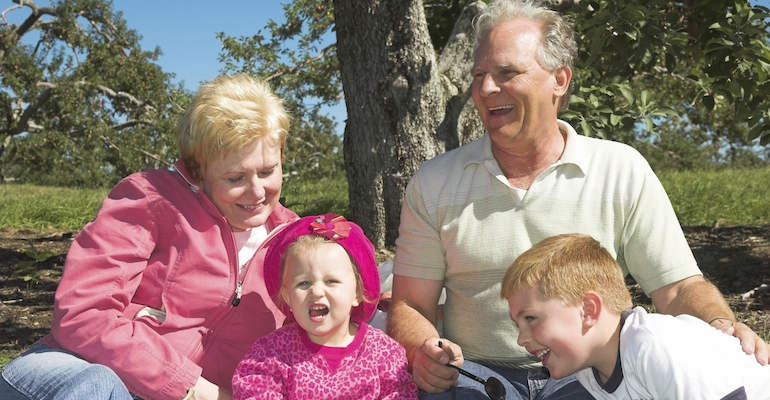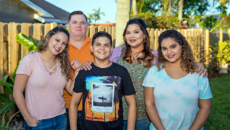Last year, Dan Biddell took his kids to the beach and created a commotion. While his wife, Christine, stayed home, Dan shepherded the seven youngsters — then all age seven and younger — down to the water’s edge.
“It’s so nice that you get to vacation with your grandchildren,” said a woman nearby.
“Well, no, these are my kids,” said Biddell, who is 53.
Every day Biddell and other adoptive parents in their forties and fifties confront mistaken identity and a host of other tricky, confusing, and sometimes funny challenges. The older-parent phenomenon is becoming more common, as older couples and singles take the parenthood plunge through adoption. Some are first-time parents; others are rearing a second family.
Are they crazy? As Melanie Hadsell, a 50-year-old California single mom to Libby, age six says, “People may have thought it, but they didn’t say it.” And who cares? Most older adoptive parents think having kids late in life is terrific — for them and for their kids.
“It has worked out nicely for us,” says Susan Becker-Weidman, 51. She and her husband, Arthur, 48, who live in Williamsville, New York, are raising three children, including six year old, Samantha, adopted as a baby. “I was surprised that people didn’t tell me how great it is,” says Becker-Weidman.
“We love middle-life adoptive parents,” says Ellen Bloom, L.C.S.W., a single adoptive mom who is director of social services for the World Association for Children and Parents in Renton, Washington. “By the time 40- and 50-year-old people get to parenting, they are ready to take on the challenge.”
Why So Many Gray-Haired Parents?
Adopting late in life is nothing new. Like many other couples, adoptive parents are waiting longer to start families. In addition, countries that place children internationally — China, Russia, and Vietnam — have made it easier for people in midlife to adopt by establishing favorable age requirements. Moreover, many couples spend years in infertility treatments before exploring adoption. Other contributing factors include our society’s changing concept of aging and its broader definition of what is a family.
Thanks in part to their age, older couples generally have a very clear vision when they decide to adopt. “They are ready to focus on parenting,” says Bloom. “That is a huge plus for kids.”
Kathy Milam, a 50-year-old single mom to two boys in Seattle, concentrated on her education and her career before deciding to adopt. “Frankly, I didn’t feel I was ready to undertake raising someone, emotionally or financially, until I turned 48,” says Milam, mom to Kiril, four, and Dmitry, two.
For others, adoption is a calling, a way to help children in need. Says Dan Biddell, “I think raising these kids is God’s will for my life.” The Biddells, who live in, Bostic, North Carolina, are parents to five children adopted in Russia — Nicholas, seven, Natasha, six, siblings Anastasia, eight, Tanya, seven and Stephen, five — and two half-siblings adopted in Texas, Tanner, eight, and Kendra, six.
The Case for Older Parents
Despite some complications, these families believe they have a lot to offer children. They had already done it all — built a career, bought a house, traveled abroad — so they are eager to focus on their families. “We live our life around family,” notes Arthur Becker-Weidman.
Older parents tend to be financially stable and established in their careers. That’s not to say that the triple whammy — paying for adoption while saving for retirement and college — doesn’t pinch the pocketbook. Some admit that college savings may be the luxury that gets left by the wayside. “We were told to stop with one kid and invest our money,” says Donna Drialo, “Instead, we decided to diversify.” Drialo, 52, and her husband, Richard McKeown, 41, have four adopted children — Elizabeth, eight, from Russia; Dolma, seven, from Sikkim; Christina, four, from Texas; and Lilianna, three, from India. By adopting several children, Drialo says, they’ve reduced their ability for college savings, but they’ve given their children a family, and opportunities they would not have had otherwise.
Older parents are less likely to listen to experts and even less likely to care what anyone else thinks. One evening last year, Ellen Singer, 46, a clinical social worker with the Center for Adoption Support and Education in Silver Spring, Maryland, and her son were in a restaurant, and little Joseph, then 20-months-old, began to wail. Singer saw some friends and went over to apologize for the commotion. “I’m really sorry if he disturbed you,” she told them. “But I am 45 years old, and I really don’t care.” She says, “They howled. They just howled.”
Perhaps most importantly, older parents bring a special perspective to their job, one born of age and maturity. “What I lack in energy, I think I make up for in wisdom,” says Chris Biddell, 46. “I feel more adequate now than I did with my first set of kids. I know what is important. I’ve learned to choose my battles.”
Whatever the challenges, the end result is the same — older parents are having a ball. So maybe older parents aren’t crazy, just gutsy.
“It takes courage to say, ‘Well, I will give it a try and hope I’m not making a mistake,'” says Milam. “This has been the most miraculous thing that’s ever happened to me. They have given me so much more than I have given them.”



